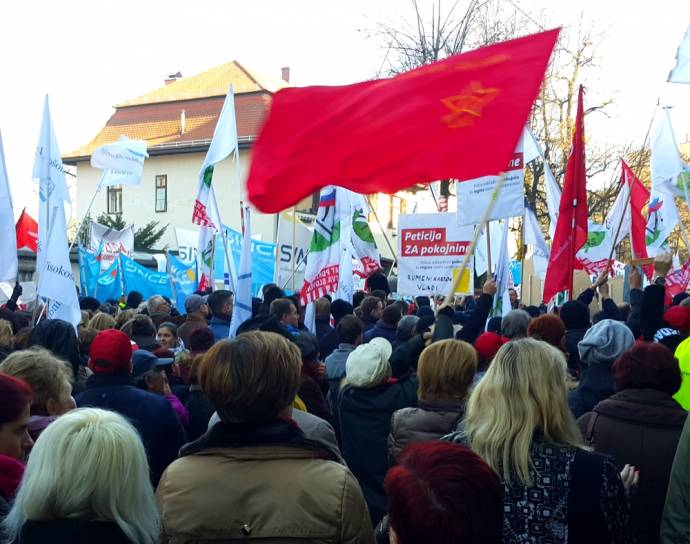STA, February 9, 2018 - Three separate groups of employees in the public sector will go on strike next week, starting with police officers on Monday. Healthcare and social care workers will follow suit on Tuesday and employees in education will stage a walkout on Wednesday.
The strikes will be organised by five public sector trade unions representing more than 80% of all union members in the public sector, according to Branimir Štrukelj, the chairman of the public sector trade union confederation KSJS.
They decided to launch the strikes after talks with the government over their pay demands, estimated at almost a billion euro per year, fell through earlier this week.
Although their demands differ, the trade unions' common goal is to keep the collective bargaining agreements as the platform for talks on specific issues, Štrukelj said.
This will be the second wave of strikes after some 30,000 employees in the state administration, healthcare, social care and some educational institutions staged a strike on 24 January.
Police officers to get the strikes off the ground on Monday
Police officers and other Interior Ministry employees will be the first to go on strike next week. According to the head of the Police Trade Union of Slovenia (PSS), Radivoj Uroševič, the strike will start on Monday and continue until their demands are met.
Some 9,000 employees are expected to take part in the industrial action, which will be in line with the legal restrictions for police strikes.
Police officers will still work to prevent any actions that put people's lives, health or property at risk, Uroševič said. A rally will also be staged in front of the Government Palace.
The head of the Trade Union of Police Officers (SPS), Kristjan Mlekuš, said they demanded that police work be valued according to their tasks, powers, responsibilities and danger they are exposed to daily.
Healthcare and social care workers picking up the baton on Tuesday
Healthcare and social care workers will stage a two-hour token strike between 8 AM and 10 AM on Tuesday.
Health institutions will shift to Sunday work mode, with rallies held in front of regional healthcare hubs, including Slovenian's biggest hospital, UKC Ljubljana.
The Trade Union of Health Care (representing mostly nurses) and the Trade Union of Health and Social Care announced they enjoyed high support and that the strike would be joined by some employees who are not members of the trade unions.
Over 40,000 people work in health care and social care in Slovenia.
Zvone Vukadinovič of the Trade Union of Health and Social Care, which represents nurses, radiology technicians, pharmacists, social care and retirement homes workers, cooks etc., said the strike was not aimed at harming patients or those in elderly homes, but if the strike failed to bring results, the staff would step up their action.
No class for kindergarten and school children on Wednesday
Employees in education, who were the first to threaten the government with the strike, will be the last group to join the strike wave.
According to Štrukelj, who is also the secretary general of the SVIZ trade union of teachers teachers and scientist, teachers in a vast majority of kindergartens and schools will join the strike.
The trade union's call for strike was backed by more than 37,000 members, while 15,000 of them are expected to take part in a rally in Ljubljana at noon on Wednesday.
A spat has broken out between the trade union and the ministry over whether there were any restrictions for the teachers' strike after the Education Ministry sent out a message that children must be looked after at kindergartens and schools during the working hours.
The trade union has rejected the claims, but said that kindergartens and primary schools would take in and take care of children if agreed with the parents, but there would be no class.







